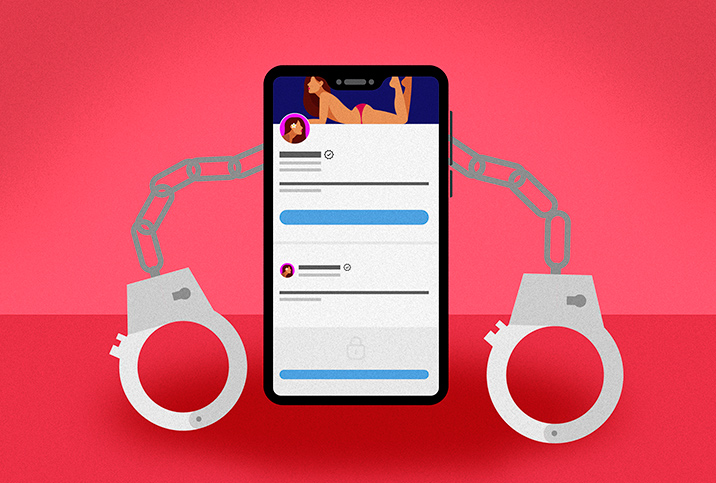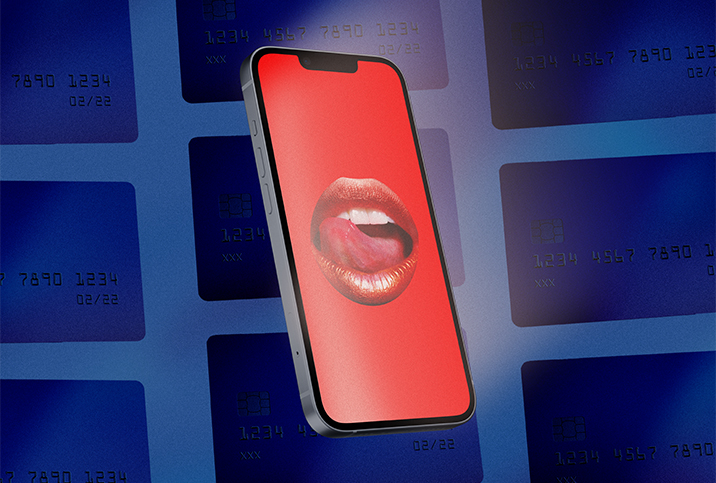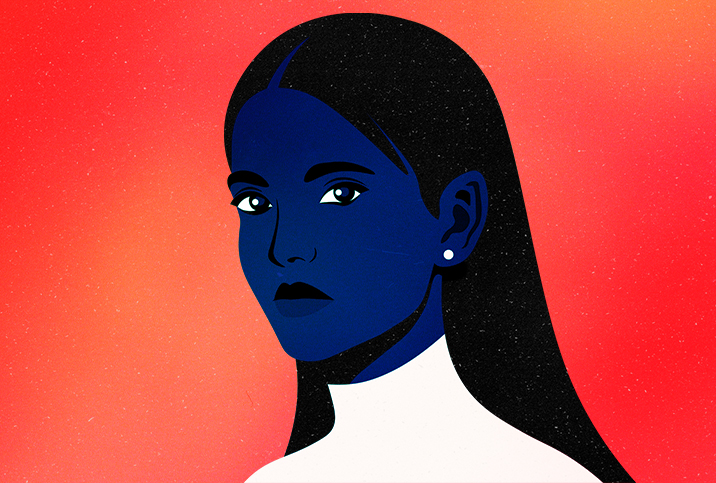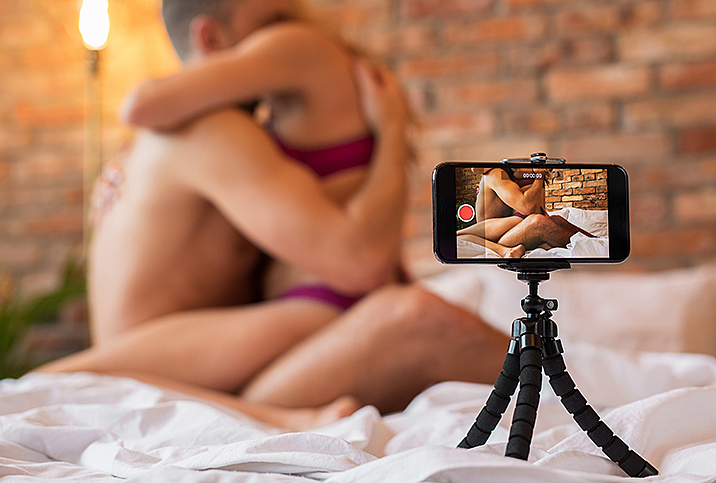The Blurry Legal Line Between Modeling and Online Sex Work

When OnlyFans made headlines for its short-lived decision to ban adult content, it put an old question into a new context: Why do we have laws against prostitution?
Any comprehensive answer to that question would be rambling and long-winded. In the age of the pocket internet and the advancing "metaverse," it's never been more important to examine how state authorities and agencies view online adult content through a legal lens.
A history of ambiguous sexual representation
Determining the difference between lawful personal or business activity and illicit sex work, online or elsewhere, ultimately falls on the shoulders of law enforcement agencies. The amount of criminal and potentially criminal activity online is staggering; as it stands, it would be completely unreasonable to expect law enforcement agencies in the U.S. to effectively monitor online activity with ethical surveillance in mind.
This is why you may have seen escorts or erotic services advertised online with little regard for the law. The murky legal waters of online sex work make prosecution a tricky matter when it comes to investigation and evidence.
"Law enforcement is a really very dated organism," said Derek Bambauer, a law professor at the University of Arizona in Tucson. He explained that the 'stretched thin' nature of law enforcement agencies, combined with shifting administrative policies nationwide, influenced by variably principled bureaucracies, leads to an inconsistent application of the law.
"You have 50 state attorneys general, you have 50 U.S. attorneys' offices, plus the one in D.C.," Bambauer said. "You have the Central Department of Justice and then you have the policy agenda, if you will, of both the president and the acting attorney general. And so, for example, we see a real uptick in prosecutions for obscenity under Attorney General [John] Ashcroft and then-Attorney General [Alberto R.] Gonzales, because, for whatever reason, they decided that was a priority for them.
"And so what that means is that the legal landscape, in theory, kind of has one rule that binds everybody. But the way that it's operationalized on the ground varies in both time and space."
Can the law slide into my DMs?
"Law enforcement routinely monitors publicly available social media," said Bambauer, who lectures on both internet law and intellectual property. "There's no barrier to somebody who is a law enforcement officer or agent trying to befriend people on Facebook or follow people on Twitter if they allow it, because it's essentially voluntary that you're exposing that content."
Bambauer said this has led to instances of antiwar groups and other perceivably harmless organizations finding themselves under constitutionally questionable surveillance through social media.
For people who work in adult mediums or who engage with clients in a sexual way, social media is a powerful tool. The platforms conceivably connect you with an audience and clientele list with almost unlimited reach. However, the legal ambiguity concerning adult content and solicitation makes this more difficult.
People who work with, and around, sex have to keep in mind that their activities online can be tracked at all times and are often relatively easy for law enforcement to obtain. Is it always worth it for police departments to sort through data records just to prosecute a sex worker or independent pornographer? Not always, but different administrations and districts look at the broad concept of obscenity through different lenses. The agencies that insure and regulate banking transactions, the banks themselves and the credit card companies are a whole other story.
From sites like Facebook to more pointed ones like OnlyFans, it's come down to companies to establish law in a lawless land.
The bottom line here is that there are way too many intersecting aspects of law and industry for the issue of online content to be dealt with easily. Right now, the legislative answer to this conundrum is to let tech companies and financial institutions determine the rules.
Bambauer said we can't necessarily blame social media companies for failing to manage the content that proliferates on their platforms. His research on internet censorship and cybersecurity—along with technical writing he has done concerning data recovery, fault tolerance and the deployment of software upgrades—gives him a unique perspective on the subject.
"I have some sympathy for Facebook because they are trying to craft rules that can be relatively easily described and implemented for an unmanageable amount of content," he said.
As an example, Bambauer pointed out Facebook's ban on breastfeeding photos on the basis of obscenity. All social media companies have a vested interest in not being perceived as hosting adult content, so Facebook created a policy and programming practice that would theoretically help facilitate that objective. It did not intend to stigmatize breastfeeding or upset users, but those consequences were unavoidable. These incidents may seem to come and go, but they have a cumulative and influential impact. From sites like Facebook to more pointed ones like OnlyFans, it's come down to companies to establish law in a lawless land.
And if what you do can be called pornography, you might have problems from the bank to the courtroom. Why is that exactly? And where do we find the checklist for the things that make porn, porn?
The space between modeling and pornography
"I don't know that there is a line," said Lawrence A. Siegel, a clinical sexologist and educator based in Boynton Beach, Florida. "There's some space. But I think it's a very fluid space and it really depends on the specific situation."
Modeling, for Siegel, is by definition about observing, while "porn is more about participating."
The difference between modeling and pornography, outside of an industrial or commercial context, is really the degree to which we are euphemizing our own masturbation. Models provide a kind of meta-existential masturbatory experience, whereas pornography simulates and induces a more primal and, perhaps, biologically driven masturbatory act.
"A lot of people don't realize that, early on, most music videos were directed and produced by porn producers and directors," Siegel said. "Women are sexualized and objectified in a way that you see with porn. They have this pornographic gaze, which is the term that's used, where the camera is always panning up and down a woman's body. She's never really seen as a human being. Women are there, pretty much, for the pleasure of men."
These origins emphasize the rich history of saying one type of sexualization is okay while condemning others without clarifying which is which. Siegel pointed out that violent footage from porn, commercials, music videos and other popular entertainment sources can often be easily interspersed with other sources without any sense of discontinuity. He has seen such footage put together from popular media, advertisements and pornographic footage, and he described the finished product of these collages as having given him "chills."
Putting an end to psycho-sexual vertigo for all
It's safe to assume that the state of media today includes room for a viable industry of ethical, creator-owned pornography with mindful sexual education as a driving theme. People want to create this type of porn and people want to watch it.
In the absence of mainstream, ethical adult content, young people flock to social media sites, sexually ambiguous online modeling content and often unhealthy images found on online porn sites. The toxic influence of social media on young people and adults has become more and more of a conversation over the last decade, along with the influence of negative sexual depictions in porn.
Siegel didn't go so far as to say that porn images will definitely lead to violent sexual associations, but he said repeated exposure to violent sexual imagery from a number of sources can lead to desensitized attitudes about sexual violence.
"The content seen in porn, advertising, entertainment and now social media can create an expectation that sexual violence is supposed to be happening," Siegel added. "When we look over the last 20 to 25 years, we have seen an unbelievable increase in the number of relationship or intimate partner violence among adolescents."
Online content is unlikely to be censored because of public interest. By holding onto outmoded moral concepts about obscenity and sexual expression, we have allowed sexual content to proliferate without the mitigating presence of abundant healthy, sex-based education and dialogue.
It shouldn't be up to companies like OnlyFans or those other ‘meta' media monoliths to determine what kinds of content we can create, distribute and absorb. We should also be able to educate and entertain ourselves without input from legislators or corporate board members.
Ultimately, we need to understand the role sexuality plays in an increasingly digital domain before we discuss what we see, hear and feel in a healthy way. How can we teach appropriate behavior in a society that doesn't even know what appropriate behavior is within its own boundaries?
Looking for a simple solution
Knots tend to form when you have too many lines overlapping and wrapping around one another. Prostitution and obscenity laws have long been disputed in terms of their efficacy and importance, dating back to long before the internet.
It seems like sex work and illicit modeling laws of old overlap with laws meant for online content and now we have a Gordian Knot of intertwining and inseparably tangled litigations and loopholes to contend with.
Perhaps the answer is to cut through them all.
The simplest solution is often the right one, and in this case, it seems that, in many ways, the simplest solution might be to decriminalize sex work and stop seeing sexuality as obscene, in general.


















